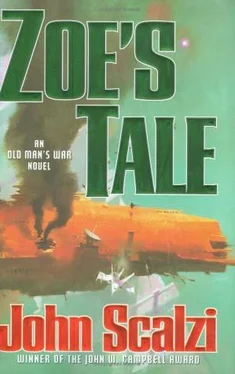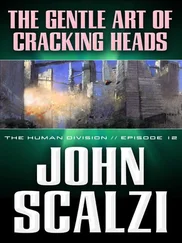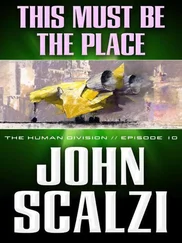When that realization hit, it hit people hard—and an even harder hit was the realization that everyone else that any of us ever cared about knew nothing about what happened to us. If the Colonial Union wasn't going to tell us where we were going in order to fool this Conclave thing, they certainly weren't going to tell everyone else that they had pulled a fast one with our whereabouts. Everyone we ever knew thought we were lost. Some of them probably thought we had been killed. John and Jane and I didn't have much to worry about on this score—we were each other's family, and all the family we had—but everyone else had someone who was even now mourning them. Savitri's mother and grandmother were still alive; the expression on her face when she realized that they probably thought she was dead made me rush over to give her a hug.
I didn't even want to think about how the Obin were handling our disappearance. I just hoped the Colonial Union ambassador to the Obin had on clean underwear when the Obin came to call.
The second sacrifice was harder.
* * *
"You're here," Jane said, as I walked up to her. She reached down to pet Babar, who had come bounding up to her.
"Apparently," I said. "Is it always like this?"
"Like what?" Jane said.
"Muddy," I said. "Rainy. Cold. Sucky."
"We're arriving at the beginning of spring here," Jane said. "It's going to be like this for a little while. I think things will get better."
"You think so?" I asked.
"I hope so," Jane said. "But we don't know. The information we have on the planet is slim. The Colonial Union doesn't seem to have done a normal survey here. And we won't be able to put up a satellite to track weather and climate. So we have to hope it gets better. It would be better if we could know. But hoping is what we have. Where's Gretchen?"
I nodded in the direction I saw her go. "I think she's looking for her dad," I said.
"Everything all right between you two?" Jane said. "You're rarely without each other."
"It's fine," I said. "Everyone's twitchy these last few days, Mom. So are we, I guess."
"How about your other friends?" Jane asked.
I shrugged. "I haven't seen too much of Enzo in the last couple of days," I said. "I think he's taking the idea of being stranded out here pretty badly. Even Magdy hasn't been able to cheer him up. I went to go visit him a couple of times, but he doesn't want to say much, and it's not like I've been that cheerful myself. He's sending me poems, still, though. On paper. He has Magdy deliver them. Magdy hates that, by the way."
Jane smiled. "Enzo's a nice boy," she said.
"I know," I said. "I think I didn't pick a great time to decide to make him my boyfriend, though."
"Well, you said it, everyone's twitchy the last few days," Jane said. "It'll get better."
"I hope so," I said, and I did. I did moody and depressed with the best of them, but even I have my limits, and I was getting near them. "Where's Dad? And where's Hickory and Dickory?" The two of them had gone down in one of the first shuttles with Mom and Dad; between them making themselves scarce on the Magellan and being away for the last few days, I was starting to miss them.
"Hickory and Dickory we have out doing a survey of the surrounding area," Jane said. "They're helping us get a lay of the land. It keeps them busy and useful, and keeps them out of the way of most of the colonists at the moment. I don't think any of them are feeling very friendly toward nonhumans at the moment, and we'd just as soon avoid someone trying to pick a fight with them."
I nodded at this. Anyone who tried to pick a fight with Hickory or Dickory was going to end up with something broken, at least. Which would not make the two of them popular, even (or maybe especially) if they were in the right. Mom and Dad were smart to get them out of the way for now.
"Your dad is with Manfred Trujillo," Jane said, mentioning Gretchen's dad. "They're laying out the temporary village. They're laying it out like a Roman Legion encampment."
"We're expecting an attack from the Visigoths," I said.
"We don't know what to expect an attack from," Jane said. The matter-of-fact way she said it did absolutely nothing to cheer me up. "I expect you'll find Gretchen with them. Just head into the encampment and you'll find them."
"It'd be easier if I could just ping Gretchen's PDA and find her that way," I said.
"It would be," Jane agreed. "But we don't get to do that anymore. Try using your eyes instead." She gave me a quick peck on the temple and then walked off to talk to the Magellan crew. I sighed and then headed into the encampment to find Dad.
* * *
The second sacrifice: Every single thing we had with a computer in it, we could no longer use. Which meant we couldn't use most things we had.
The reason was radio waves. Every piece of electronic equipment communicated with every other piece of electronic equipment through radio waves. Even the tiny radio transmissions they sent could be discovered if someone was looking hard enough, as we were assured that they were. But just turning off the connecting capability was not enough, since we were told that not only did our equipment use radio waves to communicate with each other, they used them internally to have one part of the equipment talk to other parts.
Our electronics couldn't help transmitting evidence that we were here, and if someone knew what frequencies they used to work, they could be detected simply by sending the radio signal that turned them on. Or so we were told. I'm not an engineer. All I knew was that a huge amount of our equipment was no longer usable—and not just unusable, but a danger to us.
We had to risk using this equipment to land on Roanoke and set up the colony. We couldn't very well land shuttles without using electronics; it wasn't the trip down that would be a problem, but the landings would be pretty tricky (and messy). But once everything was on the ground, it was over. We went dark, and everything we had in cargo containers that contained electronics would stay in those containers. Possibly forever.
This included data servers, entertainment monitors, modern farm equipment, scientific tools, medical tools, kitchen appliances, vehicles and toys. And PDAs.
This was not a popular announcement. Everyone had PDAs, and everyone had their lives in them. PDAs were where you kept your messages, your mail, your favorite shows and music and reading. It's how you connected with your friends, and played games with them. It's how you made recordings and video. It's how you shared the stuff you loved, to the people you liked. It was everyone's outboard brain.
And suddenly they were gone; every single PDA among the colonists—slightly more than one per person—was collected and accounted for. Some folks tried to hide them; at least one colonist tried to sock the Magellan crew member who'd been assigned to collect them. That colonist spent the night in the Magellan brig, courtesy of Captain Zane; rumor had it the captain cranked down the temperature in the brig and the colonist spent the night shivering himself awake.
I sympathized with the colonist. I'd been without my PDA for three days now and I still kept catching myself reaching for it when I wanted to talk to Gretchen, or listen to some music, or to check to see if Enzo had sent me something, or any one of a hundred different things I used my PDA for on a daily basis. I suspected that part of the reason people were so cranky was because they'd had their outboard brains amputated; you don't realize how much you use your PDA until the stupid thing is gone.
We were all outraged that we didn't have our PDAs anymore, but I had this itchy feeling in the back of my brain that one of the reasons people were so worked up about their PDAs was that it kept them from having to think about the fact that so much of the equipment we needed to use to survive, we couldn't use at all. You can't just disconnect the computers from our farm equipment; it can't run without it, it's too much a part of the machine. It'd be like taking out your brain and expecting your body to get along without it. I don't think anyone really wanted to face the fact of just how deep the trouble was.
Читать дальше











